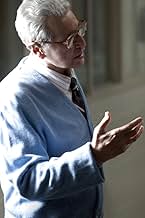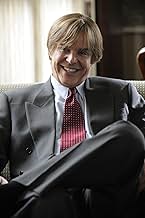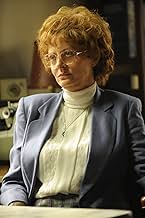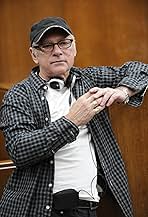NOTE IMDb
7,5/10
31 k
MA NOTE
Ajouter une intrigue dans votre langueA look at the life and work of doctor-assisted suicide advocate Jack Kevorkian.A look at the life and work of doctor-assisted suicide advocate Jack Kevorkian.A look at the life and work of doctor-assisted suicide advocate Jack Kevorkian.
- Réalisation
- Scénario
- Casting principal
- Récompensé par 2 Primetime Emmys
- 11 victoires et 38 nominations au total
Histoire
Le saviez-vous
- AnecdotesBased on Neal Nicol's and Harry Wylie's novel, "Between the Dying and the Dead: Dr. Jack Kevorkian, the Assisted Suicide Machine and the Battle to Legalize Euthanasia." It was published by Vision in 2006.
- GaffesDr. Kevorkian's original death machine (using IV drugs) was called the Thanatron, not Mercitron. The Mercitron was the name of his carbon monoxide based death machine.
- Citations
Lynn Mills: Have you no religion? Have you no God?
Jack Kevorkian: Oh, I do, lady, I have a religion, his name is Bach. Johann Sebastian Bach. And at least my God isn't an invented one.
- Bandes originalesEarly in the Morning
Written by Dallas Bartley, Leo Hickman & Louis Jordan
Performed by Harry Nilsson
Courtesy of RCA Records
By Arrangement with Sony Music Entertainment
Commentaire à la une
Actors have been known to sit on their laurels. Some would argue that, with Oscar, Emmy, and Tony as best mates on the mantelpiece, Al Pacino can do just that. Do we respectfully think that all his truly great performances are in the past? Godfather, Michael Corleone? Or Scarface, Tony Montana? Happily we can think again. Seeing You Don't Know Jack, we know it's the film Pacino fans have waited for.
Opening scenes give us Dr 'Death' Kevorkian. Before he invents his famous assisted suicide machine. I look closely at this point. I have to reassure myself it is indeed Pacino, not a docu-drama cut-in. For Pacino looks more like Kevorkian than Kevorkian does. Face, body language, tone of voice, the works.
The first achievement is to captivate with the character himself. Not the divisive issues he represents. Bypass the hazards of predictable biopics. Or monotonous 'message' movies. This is quality mainstream film-making and at its best. It doesn't seek to change views, and the spiky Mr Kevorkian leaves plenty of room to disagree, isolating himself often from even his own supporters. This is a passionate man who has little time for other people's views in any general sense. "Who cares what other people think?" he exclaims. "It's what my patient feels." This is not the first time director Barry Levinson has astounded audiences. Slick approaches shaking up accepted thinking. Wag the Dog was to be a wildcard that would embarrass Clinton's government. The Oscar-winner, Rain Man, was criticised for creating a misleading stereotype (Is every autistic person a closet savant? Of course not.) But what Rain Man did do was raise awareness. Make it OK to talk openly about autism. And – perhaps this is the secret – You Don't Know Jack could have a similar effect just because it is just as funny, just as entertaining, just as engaging and just as challenging. We so get many different emotions in fast succession on the screen, until we're primed to consider , "How do I really feel about this?" Real people (including death scenes with Kevorkian's patients) are more gutsier coathooks for feelings than the vague ethical constructs debated in every high school.
If movies learn anything from TV, it's how to keep audience attention. And You Don't Know Jack is suitably punchy. It dismisses any thought of getting up for coffee. No boring arguments for or against euthanasia. None of those Clint Eastwood, long and meditative, 'Million Dollar Baby' moments. Susan Sarandon even brings some of her own caustic lines to a film that often brims over with dark, surreal humour. "Is that Santa Claus stepping on a baby?" she asks casually at an exhibition of Kevorkian's bizarre paintings.
There are powerful performance in abundance, not least from the underrated Danny Huston who plays Fieger, Kevorkian's larger-than-life attorney. (Immediately after the movie first aired, the real Geoffrey Fieger announced he will 'maybe stand again' for governor.) Fieger is a colourful, over-the-top character in real life, perfectly suited to Huston's strengths. After watching Danny Huston's talent wasted in lesser films, such as the well-intentioned Boogie Woogie, it is a joy to see him shine.
Bare-knuckle scenes in You Don't Know Jack are explicit. Both in the physical acts of assisted suicide and in their emotional intensity. Kevorkian recalls his own mother's death to Janet Good (Sarandon). "She told me, 'Imagine the worst toothache in the world – now imagine that toothache in every bone in your body." He is almost penniless (for he never charged) and, with scientific precision, he at one point tries to save on lethal gas. He places his emphysema patient in a plastic hood (to catch the gas, rather than using a face-mask). But the patient panics and it is nearly the last straw for friend and assistant Neal Nicol, played effortlessly by John Goodman. Such scenes are not for the squeamish.
The sense of sincerity and conviction which Pacino gives the role could make it rather uncomfortable viewing if you disagree outright. But this intense, yet sidelong glance at a deeply polarising topic, seriously tackled but deftly relieved with a sharp witty screenplay, might just give new life to a debate that suffers from political hubris set against rather static public opinion.
You Don't Know Jack reveals a person a long way from popular conceptions. Even if you read his autobiography and see him in interview, as I have, he was and still is, a hard person to fathom. An egocentric – or to use a word he suggested himself – a zealot – it often seems that Kevorkian believes in himself to the point of being inaccessible. "You're gonna need some business cards you know!" chides his sister. For this driven man who is happy to live on a pittance and then go on hunger strike, the importance of such details can, it seems, easily be missed.
At over two hours long, the movie occasionally verges on repetition. Levinson, back on form after several also-rans, maintains the pace with intelligent humour and inventive cinematography. "You understand what prison is?" Judge Jessica Copper asks Kevorkian, who seems oblivious of the potential consequences of his actions. "Did you see The Shawshank Redemption, Sir?" During the hunger strike, a fast montage of slamming doors and uneaten foodtrays makes an impression on our ears and eyes faster than any amount of words – and also provides a welcome change of tempo.
This is cinema of the unexpected. With subject matter that should have been unbankably inauspicious. Yet You Don't Know Jack triumphs to take your breath away. Even without a plastic hood.
Opening scenes give us Dr 'Death' Kevorkian. Before he invents his famous assisted suicide machine. I look closely at this point. I have to reassure myself it is indeed Pacino, not a docu-drama cut-in. For Pacino looks more like Kevorkian than Kevorkian does. Face, body language, tone of voice, the works.
The first achievement is to captivate with the character himself. Not the divisive issues he represents. Bypass the hazards of predictable biopics. Or monotonous 'message' movies. This is quality mainstream film-making and at its best. It doesn't seek to change views, and the spiky Mr Kevorkian leaves plenty of room to disagree, isolating himself often from even his own supporters. This is a passionate man who has little time for other people's views in any general sense. "Who cares what other people think?" he exclaims. "It's what my patient feels." This is not the first time director Barry Levinson has astounded audiences. Slick approaches shaking up accepted thinking. Wag the Dog was to be a wildcard that would embarrass Clinton's government. The Oscar-winner, Rain Man, was criticised for creating a misleading stereotype (Is every autistic person a closet savant? Of course not.) But what Rain Man did do was raise awareness. Make it OK to talk openly about autism. And – perhaps this is the secret – You Don't Know Jack could have a similar effect just because it is just as funny, just as entertaining, just as engaging and just as challenging. We so get many different emotions in fast succession on the screen, until we're primed to consider , "How do I really feel about this?" Real people (including death scenes with Kevorkian's patients) are more gutsier coathooks for feelings than the vague ethical constructs debated in every high school.
If movies learn anything from TV, it's how to keep audience attention. And You Don't Know Jack is suitably punchy. It dismisses any thought of getting up for coffee. No boring arguments for or against euthanasia. None of those Clint Eastwood, long and meditative, 'Million Dollar Baby' moments. Susan Sarandon even brings some of her own caustic lines to a film that often brims over with dark, surreal humour. "Is that Santa Claus stepping on a baby?" she asks casually at an exhibition of Kevorkian's bizarre paintings.
There are powerful performance in abundance, not least from the underrated Danny Huston who plays Fieger, Kevorkian's larger-than-life attorney. (Immediately after the movie first aired, the real Geoffrey Fieger announced he will 'maybe stand again' for governor.) Fieger is a colourful, over-the-top character in real life, perfectly suited to Huston's strengths. After watching Danny Huston's talent wasted in lesser films, such as the well-intentioned Boogie Woogie, it is a joy to see him shine.
Bare-knuckle scenes in You Don't Know Jack are explicit. Both in the physical acts of assisted suicide and in their emotional intensity. Kevorkian recalls his own mother's death to Janet Good (Sarandon). "She told me, 'Imagine the worst toothache in the world – now imagine that toothache in every bone in your body." He is almost penniless (for he never charged) and, with scientific precision, he at one point tries to save on lethal gas. He places his emphysema patient in a plastic hood (to catch the gas, rather than using a face-mask). But the patient panics and it is nearly the last straw for friend and assistant Neal Nicol, played effortlessly by John Goodman. Such scenes are not for the squeamish.
The sense of sincerity and conviction which Pacino gives the role could make it rather uncomfortable viewing if you disagree outright. But this intense, yet sidelong glance at a deeply polarising topic, seriously tackled but deftly relieved with a sharp witty screenplay, might just give new life to a debate that suffers from political hubris set against rather static public opinion.
You Don't Know Jack reveals a person a long way from popular conceptions. Even if you read his autobiography and see him in interview, as I have, he was and still is, a hard person to fathom. An egocentric – or to use a word he suggested himself – a zealot – it often seems that Kevorkian believes in himself to the point of being inaccessible. "You're gonna need some business cards you know!" chides his sister. For this driven man who is happy to live on a pittance and then go on hunger strike, the importance of such details can, it seems, easily be missed.
At over two hours long, the movie occasionally verges on repetition. Levinson, back on form after several also-rans, maintains the pace with intelligent humour and inventive cinematography. "You understand what prison is?" Judge Jessica Copper asks Kevorkian, who seems oblivious of the potential consequences of his actions. "Did you see The Shawshank Redemption, Sir?" During the hunger strike, a fast montage of slamming doors and uneaten foodtrays makes an impression on our ears and eyes faster than any amount of words – and also provides a welcome change of tempo.
This is cinema of the unexpected. With subject matter that should have been unbankably inauspicious. Yet You Don't Know Jack triumphs to take your breath away. Even without a plastic hood.
- Chris_Docker
- 27 avr. 2010
- Permalien
Meilleurs choix
Connectez-vous pour évaluer et suivre la liste de favoris afin de recevoir des recommandations personnalisées
Détails
- Date de sortie
- Pays d’origine
- Site officiel
- Langue
- Aussi connu sous le nom de
- You Don't Know Jack
- Lieux de tournage
- Sociétés de production
- Voir plus de crédits d'entreprise sur IMDbPro
Box-office
- Budget
- 18 000 000 $US (estimé)
- Durée2 heures 14 minutes
- Couleur
- Mixage
- Rapport de forme
- 1.78 : 1
- 1.85 : 1
Contribuer à cette page
Suggérer une modification ou ajouter du contenu manquant

Lacune principale
By what name was La vérité sur Jack (2010) officially released in Canada in English?
Répondre




































